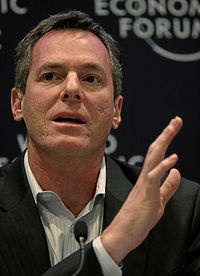Former Qualcomm chairman Paul Jacobs has approached several investors in a bid to acquire the chipmaker which he once ran and was founded by his father, the Financial Times reported without revealing any sources.
 |
|
| Paul Jacobs |
|
Jacobs has informed Qualcomm’s board of his plans and approached companies including Japan’s SoftBank Group to become one of the investors, according to the FT. A buyout of Qualcomm, which has a market capitalisation of $88.7 billion, would be one of the largest in history.
Spokesmen for Qualcomm and SoftBank didn’t immediately respond to requests for comment by media including Bloomberg. Jacobs also didn’t immediately respond.
Trying to take the mobile-phone chipmaker private may be a last-ditch effort to preserve the Jacobs family’s influence over the San Diego-based company they founded and buy more time for the current management team and its strategy, which have lost the support of public shareholders.
This week, US President Donald Trump blocked Broadcom’s hostile $117-billion bid for Qualcomm, saying the combination would result in reduced research and development spending, compromising US competitiveness and national security.
As chairman, Jacobs opposed the bid, as did the rest of Qualcomm’s current board. Before the deal was scuttled, Broadcom’s attempt to replace several of the chipmaker’s directors was on course to succeed, signalling a loss of investor support for many of Qualcomm’s board members, including chief executive officer Steve Mollenkopf as well as Jacobs, who was later demoted to director.
SoftBank is unlikely to back a Jacobs bid, according to Bloomberg citing a person familiar with the matter, because among other things it would risk undermining SoftBank’s own chip-designer ARM Holdings and burden the Japanese company’s balance sheet.
Jacobs owns less than 1 per cent of Qualcomm, according to data compiled by Bloomberg. Though the chipmaker’s stock has declined, he’s still likely to have to surpass Broadcom’s offer — one he publicly rejected as too low.
For an individual, raising the tens of billions of dollars required to initiate a leveraged buyout of more than $120 billion would be unprecedented, particularly if he was restricted to US funding sources.
Finally, were Jacobs to pursue such a deal, the board would be under fiduciary responsibility to consider other acquirers, essentially putting the company back on the block right after escaping Broadcom.
Still, taking the company private may help mitigate one of the biggest issues the current management team have faced. Qualcomm is unique in the chip industry in getting the majority of its profit from technology licensing. That revenue stream — which saw sales of more than $6 billion last year — has been under siege from regulatory actions and fines. Apple also sued and stopped paying license fees, knocking about $2 billion off annual sales.
Qualcomm’s management has argued it will win in court, reverse the fines and get the iPhone maker paying again, but hasn’t been able to say when. That’s hurt it in conversations with investors who are frustrated with a share price that has lagged behind the market. Their displeasure was brought to the surface by Broadcom’s approach.
Broadcom added to the pressure on Qualcomm’s management again late Thursday. Shareholders of both Broadcom and Qualcomm supported the deal, Broadcom chief financial officer Tom Krause said. Qualcomm’s board nominees are on course to get only 16 per cent of the votes cast at its forthcoming shareholder meeting, even though they’re now unopposed, he noted, citing current voting returns.
“Not necessarily something to celebrate down in San Diego,” Krause said.
Qualcomm’s share price, down 6.5 per cent this year, makes it a target. But raising cash to go private may be a struggle if, as Financial Times suggests, Jacobs is courting overseas investors. Even though Broadcom is run by US citizens, has the majority of its employees in the US and was created by a merger of US companies, its Singapore registration — which it’s about to give up — was enough for the Committee on Foreign Investment in the US to block the deal.




















